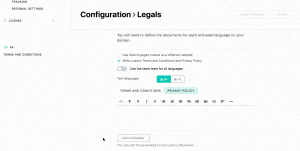Legal Notice and Cookie Consent: Make Sure Your Data Portal Complies with Privacy Regulations

Privacy and cookie regulations also apply to data portals. The Opendatasoft platform allows you to comply with them, thanks to ready-to-use templates.
Privacy laws require websites to inform users when collecting their personal data. In addition, websites are required to clarify their rights to use these data and provide information on their legal status, whether as publisher or host of the site. This policy applies to the ODS data portals that our customers published and we host.
Opendatasoft will help you comply with privacy regulations by offering you ready-to-use templates to customize your Terms of Use and Privacy Policy, and to request consent for cookie collection.
✅ Check out Configuration > Legals in the Opendatasoft platform’s back office.
Set up Terms of Use and Privacy Policy for Your Portal

You have three different options to set up your Terms and Policy:
👉 Redirect and refer to existing pages on an external site, for example, your company or organization’s website.
👉 Write your own Terms and Policy in the text editor.
👉 Use a template generated by Opendatasoft. Different templates are available to comply with regulations in the United States and France, respectively.
License Your Dataset
While you’re at it, you can create a list of different user licences for datasets in your catalog in Configuration > Legals in the back office. For each dataset, you can then assign a license from this list, which will be displayed on the Information tab.
Would you like to learn more about how to use licenses and how important they are ? Read the Choosing a license for reuse’s section in our white-paper about metadata.
Cookie Compliance
Starting from April 1 this year, website or app publishers have to comply with the e-Privacy Regulations and the General Data Protection Regulation (GDPR) when collecting cookies and tracking their websites. In accordance with these requirements, Opendatasoft has chosen to move towards a policy that is as respectful as possible for our users’ privacy.
What are we doing exactly?
👉 Removing the audience measurement tools used by the Opendatasoft team from the platform.
👉 Placing cookies only when they are absolutely necessary for the platform operation, for example, to memorize your language setting, or to record your authentification information from one page to the next.
What will happen to our clients’ portals from April 1?
👉 Because we are only keeping functional cookies on your portal, you will no longer need to display the infamous cookie consent banner. Good news for the user experience on your portal! 🎉
👉 If you use an additional analytical tool on your portal that requires consent, you will need to display a banner to request consent for cookies. Our team is currently working to improve our consent banner to comply with the regulations. With this banner, your users will be able to opt in or out at any time. Once we finish updating this consent banner, you will be able to see it under Configuration > Legals.

Growing data volumes, increasing complexity and pressure on budgets - just some of the trends that CDOs need to understand and act on. Based on Gartner research, we analyze CDO challenges and trends and explain how they can deliver greater business value from their initiatives.


